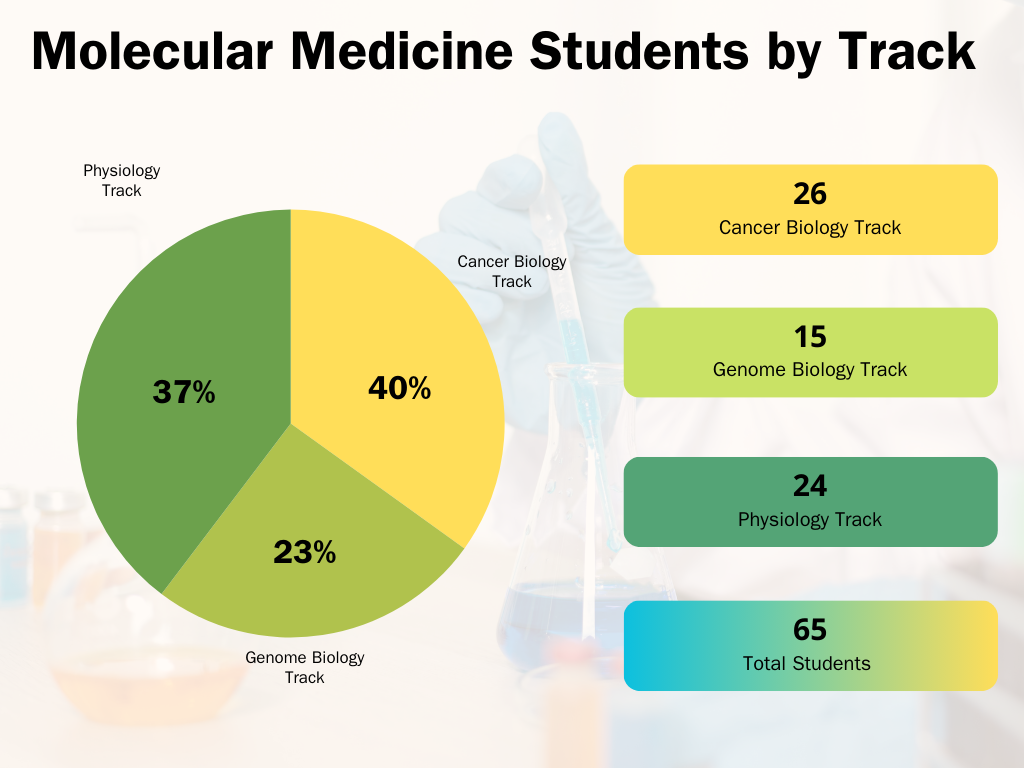Overview
The Molecular Medicine program at the University of Maryland provides an in-depth exploration of the molecular and cellular mechanisms underlying human diseases and their treatment. The program emphasizes a comprehensive understanding of molecular biology, genetics, biochemistry, and physiology. It prepares students for advanced research and careers in academia, biotechnology, and healthcare by offering a curriculum that combines rigorous coursework, seminars, and extensive laboratory research.
Students engage in cutting-edge research projects across diverse fields, including cancer biology, cardiovascular disease, neuroscience, and immunology. The program also promotes a collaborative learning environment with faculty members who are leading researchers in their respective disciplines.
For more information, visit the Molecular Medicine program website.
Program structure
The Molecular Medicine program at the University of Maryland is structured to provide a thorough grounding in biomedical sciences, emphasizing the integration of basic science research with translational applications. The curriculum includes:
-
Core Courses: Students complete foundational courses in molecular biology, biochemistry, genetics, and physiology to build a strong scientific base.
-
Elective Courses: A variety of elective courses allow students to specialize in areas such as cancer biology, immunology, neuroscience, and cardiovascular disease.
-
Laboratory Rotations: These provide exposure to different research techniques and areas, helping students choose a dissertation research focus.
-
Research and Dissertation: Students engage in independent research under faculty supervision, culminating in a dissertation that contributes original findings to the field.
-
Seminars and Journal Clubs: Regular participation in seminars and journal clubs helps students stay updated on current research and develop critical analysis skills.
-
Qualifying Exam: A qualifying exam assesses the student’s knowledge base and readiness for independent research.
For more details on the program structure, visit the curriculum page.
The Molecular Medicine program at the University of Maryland offers several specialized tracks to cater to students' diverse research interests. These tracks include:
-
Cancer Biology: Focuses on the molecular mechanisms underlying cancer development, progression, and treatment strategies.
-
Cardiovascular and Muscle Biology: Explores the molecular basis of cardiovascular diseases and muscle function, including heart failure and muscular dystrophy.
-
Genome Biology: Involves the study of genetics, genomics, and gene regulation, with applications to disease research and therapy development.
-
Molecular and Cellular Physiology: Covers the molecular mechanisms that control cell function and physiological processes in health and disease.
-
Neuroscience and Neurobiology: Examines the molecular and cellular underpinnings of nervous system function, including neurodegenerative diseases.
-
Inflammation and Immunity: Investigates the molecular and cellular processes involved in immune responses and inflammatory diseases.
These tracks allow students to tailor their education and research to align with their career goals. For more details, visit the program tracks page.
Fees and Funding
he Molecular Medicine program at the University of Maryland offers various funding options and has specific fee requirements:
Tuition and Fees:
- Graduate Tuition: Tuition rates vary depending on residency status (in-state vs. out-of-state).
- Additional Fees: These may include mandatory fees for health services, technology, and student activities.
For current tuition and fee details, visit the University of Maryland Tuition & Fees page.
Funding Opportunities:
- Graduate Assistantships: Provide stipends, tuition remission, and health insurance in exchange for research or teaching responsibilities.
- Fellowships and Scholarships: The program and university offer competitive fellowships for outstanding students based on academic merit.
- Research Grants: Students may receive funding through faculty research grants, which can cover research expenses and stipends.
- Travel Awards: Support is available for students presenting their research at scientific conferences.
For more information on funding opportunities, refer to the Graduate School's Financing Your Education page.
Scholarship Guidance
Scholarship opportunities specifically for the Molecular Medicine program at the University of Maryland are not directly listed. However, students may be eligible for various funding options, including:
-
Graduate Assistantships: These positions often provide tuition remission and stipends in exchange for research or teaching responsibilities.
-
Fellowships and Grants: The university offers fellowships based on academic merit or research interests. External grants and scholarships may also be pursued.
-
Research Funding: Faculty members may have research grants that can support graduate students.
-
Travel Awards: Students presenting at conferences may apply for travel awards to help cover expenses.
Students are encouraged to explore the Graduate School's funding opportunities for more information. Additionally, reaching out to the program's administration can provide guidance on available scholarships specific to the program.
Admission Requirements
The admission requirements for the Molecular Medicine program at the University of Maryland include:
-
Bachelor's Degree: Applicants must have a bachelor's degree from an accredited institution, typically in a field related to biological or biomedical sciences.
-
GPA: A minimum cumulative GPA of 3.0 on a 4.0 scale is generally expected.
-
Prerequisite Coursework: Prior coursework in biology, chemistry, and related subjects is recommended to ensure adequate preparation for the program.
-
Letters of Recommendation: Three recommendation letters are required, ideally from academic or professional contacts familiar with the applicant's qualifications.
-
Statement of Purpose: A written statement describing the applicant’s career goals, relevant experiences, and specific research interests.
-
Curriculum Vitae/Resume: A current CV or resume detailing educational background and relevant work experience.
-
Standardized Test Scores (Optional): GRE scores are optional and can be submitted at the applicant's discretion.
-
English Proficiency (for International Applicants): TOEFL or IELTS scores are required for non-native English speakers.
For more information, refer to the admission requirements page.
Application Procedure
To apply for the Molecular Medicine program at the University of Maryland, follow these steps:
-
Submit an Online Application: Complete the online application via the Graduate School's application portal.
-
Application Fee: Pay the non-refundable application fee during the submission.
-
Provide Transcripts: Submit official transcripts from all previously attended colleges or universities.
-
Letters of Recommendation: Obtain three letters of recommendation from individuals who can assess your academic or professional qualifications.
-
Statement of Goals and Research Interests: Write a statement outlining your career goals, relevant experiences, and specific research interests.
-
Resume/CV: Include a current curriculum vitae or resume.
-
Standardized Test Scores (Optional): GRE scores are not required but may be submitted if desired.
-
Additional Requirements for International Applicants: Non-native English speakers must submit TOEFL or IELTS scores.
For more details, visit the application instructions.

